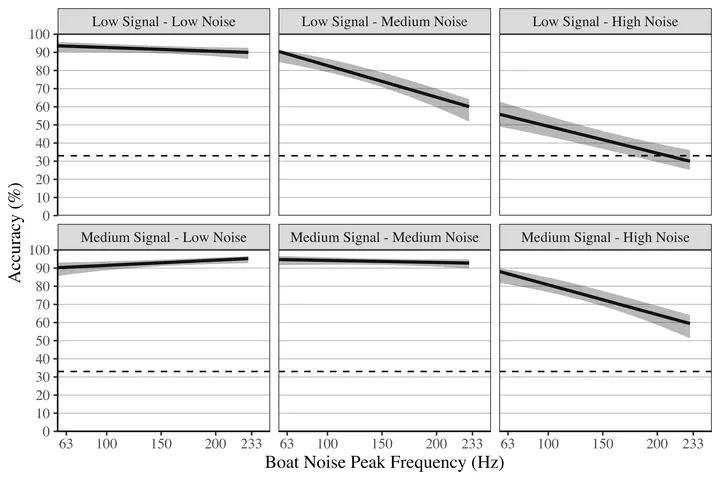How humans discriminate acoustically among bottlenose dolphin signature whistles with and without masking by boat noise
 Relationship between participants’ performance accuracy and boat noise frequency at different levels of signal and noise in Experiment 2. Chance performance was 33% accuracy. Gray bands denote 95% confidence regions.
Relationship between participants’ performance accuracy and boat noise frequency at different levels of signal and noise in Experiment 2. Chance performance was 33% accuracy. Gray bands denote 95% confidence regions.Abstract
Anthropogenic noise in the world’s oceans is known to impede many species’ ability to perceive acoustic signals, but little research has addressed how this noise affects the perception of bioacoustic signals used for communication in marine mammals. Bottlenose dolphins (Tursiops truncatus) use signature whistles containing identification information. Past studies have used human participants to gain insight into dolphin perception, but most previous research investigated echolocation. In Experiment 1, human participants were tested on their ability to discriminate among signature whistles from three dolphins. Participants’ performance was nearly errorless. In Experiment 2, participants identified signature whistles masked by five different samples of boat noise utilizing different signal-tonoise ratios. Lower signal-to-noise ratio and proximity in frequency between the whistle and noise both significantly decreased performance. Like dolphins, human participants primarily identified whistles using frequency contour. Participants reported greater use of amplitude in noise-present vs noise-absent trials, but otherwise did not vary cue usage. These findings can be used to generate hypotheses about dolphins’ performance and auditory cue use for future research. This study may provide insight into how specific characteristics of boat noise affect dolphin whistle perception and may have implications for conservation and regulations. Copyright 2020 Acoustical Society of America. This article may be downloaded for personal use only. Any other use requires prior permission of the author and the Acoustical Society of America. The following article appeared in The Journal of the Acoustical Society of America, 147(6), 4162–4174, and may be found at https://doi.org/10.1121/10.0001450.